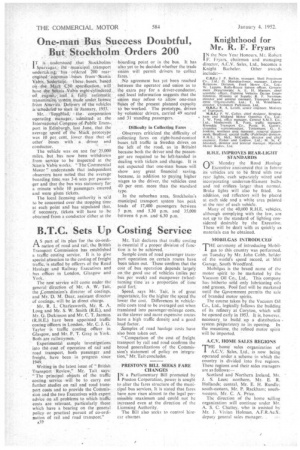B.T.C. Sets Up Costing Service
Page 34

If you've noticed an error in this article please click here to report it so we can fix it.
A'part of its plan for the co-ordination of road and rail, the British Transport Commission has established
a traffic costing service It is to give special attention to the costing of freight traffic; is staffed by officers of the Road Haulage and Railway Executives and has offices in London. Glasgow and York.
The new service will corrie under the general direction of Mr. A. W. Tait. the ;Commission's director of costings, and Mr. D. M. Dear, assistant director of ccistings, will be in direct charge.
Mr. R. L. Charlesworth, Mr. R. A. Long and Mr. S. W. Smith (R.E.), and Mr. G. Dickinson and Mr, C. T. Jarman (R..1-1.E.) have been appointed traffic costing officers in London. Mr. C. J. G. Taylor is traffic costing officer in Glasgow, and Mr. F. T. Gray in York. Both are railwayrne.n.
• Experimental sample investigations into the cost of operation of rail' and road transport, both passenger and freight, have been in progress since 1949.
Writing in the latest issue of " British Transport Review," Mr. Tait says: " The principal objects of the traffic costing service will be to carry out further studies on rail and road transport costs and to provide the Commission and the two Executives with expert advice on all problems to which traffic costs are relevant, particularly those which have a bearing on the general policy or practical pursuit of co-ordination of rail and road transport." Mr. Tait declares that traffic costing is essential if a proper division of function is to be achieved.
Sample costs of road passenger transport operation on certain routes have been taken out. These el:infirm that the cost of bus operation depends largelyon the good use of vehicles (miles per bus per week) and manpower (wheelturning time as a proportion of "time pa id for).
Speed, says Mr. Tait, is of great importance, for the higher the speed the lower the cost. Differences in vehiclemile costs tend to be averaged out when • translated into passenger-mileage costs, as the slower and more expensive routes have a high traffic density and a good load factor.
Samples of road haulage costs have also been taken out.
"Comparison of the cost of freight transport by rail and road confirms the broad generalizations of the Commission's statement of policy on integration," Mr. Tait concludes.
PRESTON'S BILL SEEKS FARE CHANGES
I N a Parliamentary Bill promoted by Preston Corporation, power is sought to alter the fares structure of the municipal bus services. It is stated thai fares have now risen almost to the legal permissible maximum and could not be increased even at the direction of the Licensing Authority.
The Bill also seeks to control hirecar charges.




















































































